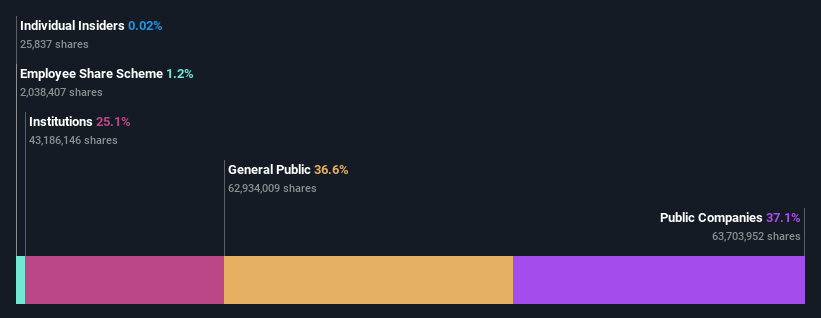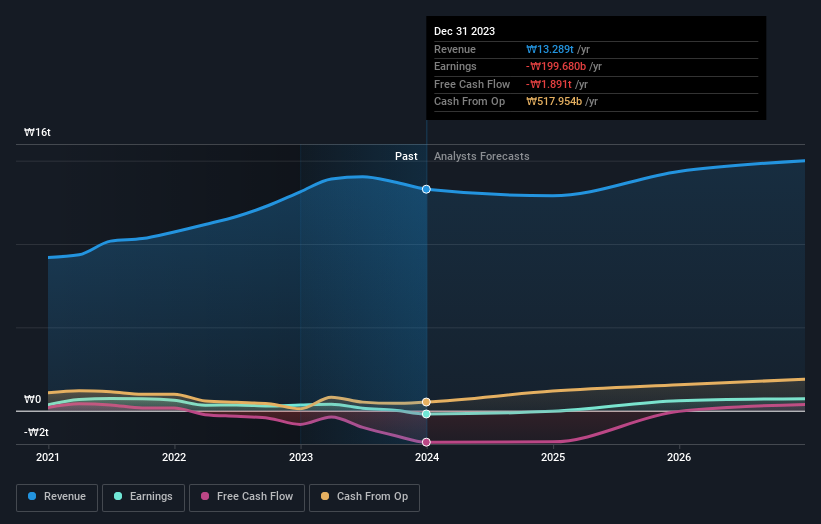- South Korea
- /
- Chemicals
- /
- KOSE:A009830
Hanwha Solutions Corporation's (KRX:009830) last week's 7.0% decline must have disappointed public companies who have a significant stake
Key Insights
- Significant control over Hanwha Solutions by public companies implies that the general public has more power to influence management and governance-related decisions
- The top 4 shareholders own 52% of the company
- Institutional ownership in Hanwha Solutions is 25%
A look at the shareholders of Hanwha Solutions Corporation (KRX:009830) can tell us which group is most powerful. The group holding the most number of shares in the company, around 37% to be precise, is public companies. Put another way, the group faces the maximum upside potential (or downside risk).
As market cap fell to ₩4.0t last week, public companies would have faced the highest losses than any other shareholder groups of the company.
Let's take a closer look to see what the different types of shareholders can tell us about Hanwha Solutions.
View our latest analysis for Hanwha Solutions

What Does The Institutional Ownership Tell Us About Hanwha Solutions?
Many institutions measure their performance against an index that approximates the local market. So they usually pay more attention to companies that are included in major indices.
We can see that Hanwha Solutions does have institutional investors; and they hold a good portion of the company's stock. This implies the analysts working for those institutions have looked at the stock and they like it. But just like anyone else, they could be wrong. When multiple institutions own a stock, there's always a risk that they are in a 'crowded trade'. When such a trade goes wrong, multiple parties may compete to sell stock fast. This risk is higher in a company without a history of growth. You can see Hanwha Solutions' historic earnings and revenue below, but keep in mind there's always more to the story.

We note that hedge funds don't have a meaningful investment in Hanwha Solutions. Our data shows that Hanwha Corporation is the largest shareholder with 37% of shares outstanding. The second and third largest shareholders are BlackRock, Inc. and National Pension Service, with an equal amount of shares to their name at 6.3%.
To make our study more interesting, we found that the top 4 shareholders control more than half of the company which implies that this group has considerable sway over the company's decision-making.
Researching institutional ownership is a good way to gauge and filter a stock's expected performance. The same can be achieved by studying analyst sentiments. There are plenty of analysts covering the stock, so it might be worth seeing what they are forecasting, too.
Insider Ownership Of Hanwha Solutions
While the precise definition of an insider can be subjective, almost everyone considers board members to be insiders. The company management answer to the board and the latter should represent the interests of shareholders. Notably, sometimes top-level managers are on the board themselves.
I generally consider insider ownership to be a good thing. However, on some occasions it makes it more difficult for other shareholders to hold the board accountable for decisions.
Our most recent data indicates that insiders own less than 1% of Hanwha Solutions Corporation. It's a big company, so even a small proportional interest can create alignment between the board and shareholders. In this case insiders own ₩597m worth of shares. It is always good to see at least some insider ownership, but it might be worth checking if those insiders have been selling.
General Public Ownership
The general public, who are usually individual investors, hold a 37% stake in Hanwha Solutions. While this size of ownership may not be enough to sway a policy decision in their favour, they can still make a collective impact on company policies.
Public Company Ownership
Public companies currently own 37% of Hanwha Solutions stock. This may be a strategic interest and the two companies may have related business interests. It could be that they have de-merged. This holding is probably worth investigating further.
Next Steps:
I find it very interesting to look at who exactly owns a company. But to truly gain insight, we need to consider other information, too. Consider for instance, the ever-present spectre of investment risk. We've identified 2 warning signs with Hanwha Solutions , and understanding them should be part of your investment process.
If you would prefer discover what analysts are predicting in terms of future growth, do not miss this free report on analyst forecasts.
NB: Figures in this article are calculated using data from the last twelve months, which refer to the 12-month period ending on the last date of the month the financial statement is dated. This may not be consistent with full year annual report figures.
Valuation is complex, but we're here to simplify it.
Discover if Hanwha Solutions might be undervalued or overvalued with our detailed analysis, featuring fair value estimates, potential risks, dividends, insider trades, and its financial condition.
Access Free AnalysisHave feedback on this article? Concerned about the content? Get in touch with us directly. Alternatively, email editorial-team (at) simplywallst.com.
This article by Simply Wall St is general in nature. We provide commentary based on historical data and analyst forecasts only using an unbiased methodology and our articles are not intended to be financial advice. It does not constitute a recommendation to buy or sell any stock, and does not take account of your objectives, or your financial situation. We aim to bring you long-term focused analysis driven by fundamental data. Note that our analysis may not factor in the latest price-sensitive company announcements or qualitative material. Simply Wall St has no position in any stocks mentioned.
About KOSE:A009830
Hanwha Solutions
Operates in the chemicals, energy solutions, and advanced materials business areas in South Korea and internationally.
Undervalued with moderate growth potential.
Similar Companies
Market Insights
Community Narratives



